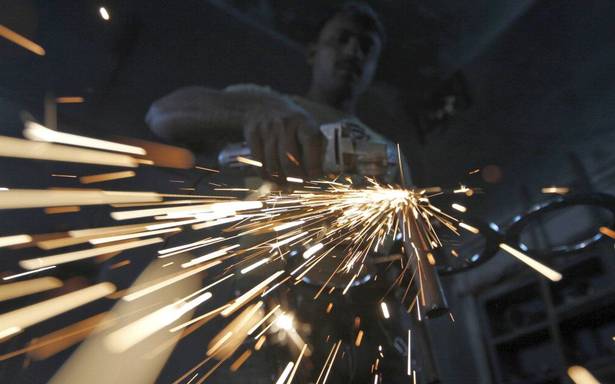The seasonally adjusted IHS Markit India Manufacturing Purchasing Managers’ Index (PMI) fell from 57.5 in February to a seven-month low of 55.4 in March
India’s manufacturing sector activities lost further growth momentum and fell to a seven-month low in March as demand was constrained by the escalation of the COVID-19 pandemic, a monthly survey said on April 5.
The seasonally adjusted IHS Markit India Manufacturing Purchasing Managers’ Index (PMI) fell from 57.5 in February to a seven-month low of 55.4 in March.
However, the latest reading was indicative of a substantial improvement in the health of the sector that outpaced the long-run series average, it said.
In PMI parlance, a print above 50 means expansion while a score below 50 denotes contraction.
“Production, new orders and input buying expanded at softer rates,” said Pollyanna De Lima, Economics Associate Director at IHS Markit.
Ms. Lima further noted that “survey participants indicated that demand growth was constrained by the escalation of the COVID-19 pandemic, while the rise in input buying was curtailed by an intensification of cost pressures.” “With COVID-19 restrictions expanded and lockdown measures re-introduced in many states, Indian manufacturers look set to experience a challenging month in April,” Ms. Lima said.
India recorded an all-time high of 1,03,558 coronavirus infections in a day pushing the nationwide COVID-19 tally to 1,25,89,067, according to the Union Health Ministry data updated on April 5.
The survey noted that employment declined in March, taking the current sequence of job shedding to a year. “Panellists indicated that the fall stemmed from COVID-19 restrictions related to workforces. Despite the reduction in payroll numbers, outstanding business rose only marginally,” Ms. Lima said.
Business confidence waned in March. While some firms foresee output growth in the coming 12 months, the vast majority predicted no change from present levels.
On the price front, the rate of input cost inflation was among the strongest seen over the past three years. However, selling prices increased only moderately as companies limited their adjustments to retain a competitive edge and boost sales.
According to experts, a sudden surge in COVID-19 cases and the government’s recent mandate asking the central bank to keep retail inflation around 4 per cent are likely to prompt the Reserve Bank of India to maintain status quo on policy rates at the next policy review to be unveiled on April 7.


